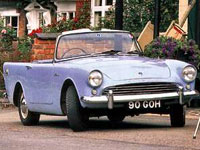
The history of Sunbeam goes back as far as 1887 when a Wolverhampton metal worker by the name of John Marston, set up a company producing high quality bicycles. Marston achieved great success with this business and in 1899 he started development of his own motor cars with another cycle engineer Henry Dinsdale. The first Sunbeam car to go on sale was the Sunbeam-Mabley designed by Maxwell Maberly-Smith in 1901. The company expanded during the next few years and in 1905 The Sunbeam Motor Company Ltd was formed.
Throughout the next decade Sunbeam was to do very well with the sale of its cars (and motorcycles) and was building a reputation as a manufacturer of quality motor vehicles. Many victories were also achieved in motor sport, giving the company recognition throughout the world as a leading car manufacturer. During the First World War Sunbeam's main work was in building aeroplane engines for the military, and car production, (apart from those produced for use by the British and Australian armed forces) took a back seat until after the war had ended. In 1920 Sunbeam merged with the French manufacturer Darracq, who a year earlier had bought the British car importer and manufacturer Clement Talbot, creating the parent company STD Motors Ltd. Motor sport was to return to Sunbeam's agenda and one of Its greatest moments was in 1927 when Sir Henry Segrave broke the land speed record by topping 200 mph in a 1000hp car.
Unfortunately during the 1930's - a troubled period for many motor manufacturers due to the economic situation of the time - STD (Sunbeam Talbot Darracq) suffered financial difficulties and fell into receivership. The company was broken up and sold off, with Sunbeam being eventually bought by the Rootes Group who also by now owned Hillman, Humber and Talbot. Although the construction of a new Sunbeam model was started, Rootes soon dropped it due to design problems, and the Sunbeam name was put to one side until Rootes created the new marque of Sunbeam-Talbot in 1938. War was to stop the production of the Sunbeam-Talbot cars in 1939, and it did not resume in the London factory until late in 1945. 1946 saw the move to Ryton near Coventry, and it was not until 1948 that a new range of Sunbeam-Talbot's arrived.
There were two models, the 80 and the 90, with the 80 using a 1185cc engine and the 90 a 2 litre unit. Both cars were available in saloon and drophead coupe form. The Sunbeam-Talbot 90, was to do very well in rallying. Sales were better for the 90 model and this resulted in the 80 being dropped from production in 1950. A new model, the Alpine, which had been developed from the 90, was added to the range in 1953 and was also to excel in rallying but production of this car ended in 1955 with the introduction of the new Rapier model. In 1954 all cars were to be badged Sunbeam, with the Talbot part of the name being dropped, and it was in 1955 that Sunbeam enjoyed an outright victory in the Monte Carlo rally with a Mk III 90.
1959 saw the launch of a new 2-door 2-seater sports car that was to revive the Alpine name. Improvements followed to all models in the Sunbeam range, and in 1964 the legendary Sunbeam Tiger was launched. This was essentially an Alpine with a Ford V8 4.2 litre engine shoehorned into its engine bay giving the car awesome performance.The next year Rootes sold part of its share holding to the Chrysler Motor Company.
New Sunbeam models were soon to be launched and these included the Sunbeam Imp Sport of 1966, which was based on the Hillman Imp, and in 1967, when Chrysler took complete control of Rootes, the new fastback Rapier. In 1969 the Fastback Alpine which was basically a lower spec version of the Rapier was introduced. The Sunbeam marque really died out with the end of production of both Alpine and Rapier in 1976, although the name Sunbeam continued to be used on some of Chrysler's export models. Peugeot was to later buy out Chrysler's European operations and launched a Talbot range of cars, and the Sunbeam name was to be used for one last time on models such as the Talbot Sunbeam and Talbot Sunbeam Lotus until 1981.


